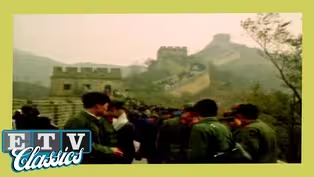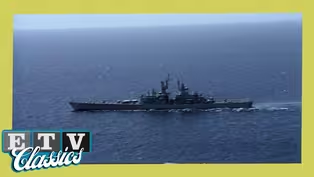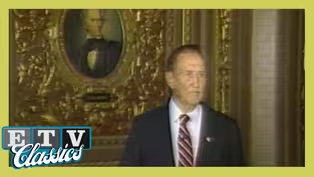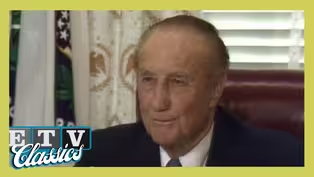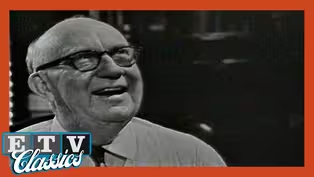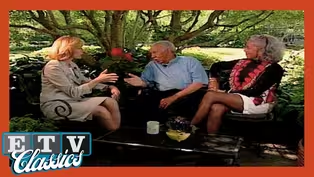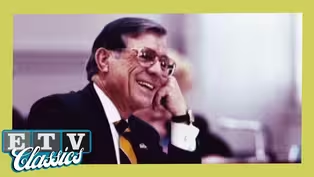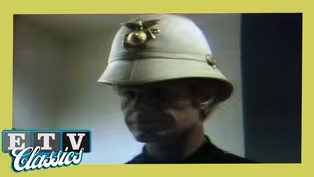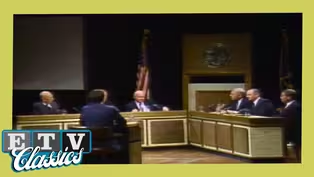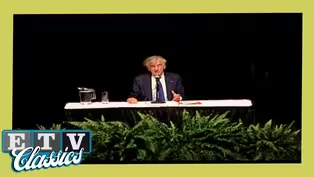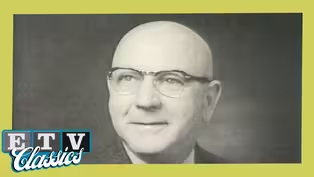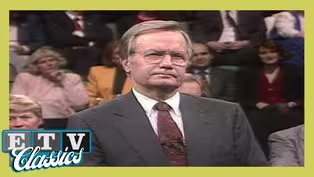ETV Classics
Charleston Place | Carolina Journal (1986)
Season 15 Episode 23 | 27m 20sVideo has Closed Captions
This edition of "Carolina Journal" revisits the opening of the Charleston Place complex.
In this gift from the tape vault, we travel back into the archives of Carolina Journal where we revisit the opening of Charleston Place complex. Mayor Joseph Riley cut the ribbons that unleashed the balloons to herald the revitalization of the city’s center. Later in the program, we get some tips on safety in the woods from the State’s Wildlife Department.
Problems playing video? | Closed Captioning Feedback
Problems playing video? | Closed Captioning Feedback
ETV Classics is a local public television program presented by SCETV
Support for this program is provided by The ETV Endowment of South Carolina.
ETV Classics
Charleston Place | Carolina Journal (1986)
Season 15 Episode 23 | 27m 20sVideo has Closed Captions
In this gift from the tape vault, we travel back into the archives of Carolina Journal where we revisit the opening of Charleston Place complex. Mayor Joseph Riley cut the ribbons that unleashed the balloons to herald the revitalization of the city’s center. Later in the program, we get some tips on safety in the woods from the State’s Wildlife Department.
Problems playing video? | Closed Captioning Feedback
How to Watch ETV Classics
ETV Classics is available to stream on pbs.org and the free PBS App, available on iPhone, Apple TV, Android TV, Android smartphones, Amazon Fire TV, Amazon Fire Tablet, Roku, Samsung Smart TV, and Vizio.
Providing Support for PBS.org
Learn Moreabout PBS online sponsorshipMore from This Collection
Find classic news and public affairs programming from South Carolina ETV.
Open Line: Carolina to Shanxi (1980)
Video has Closed Captions
An exchange program for higher education between USC and the people of China's Shanxi Province. (28m 51s)
U.S.S. South Carolina | Carolina Journal (1984)
Video has Closed Captions
Michael Collins goes aboard the missile cruiser U.S.S. South Carolina as it visits its namesake. (28m 54s)
Strom Thurmond Remembered (2003)
Video has Closed Captions
Charles Bierbauer reviews the life and accomplishments of South Carolina Senator Strom Thurmond. (1h 51m 22s)
Strom Thurmond At The Seat of Power (1982)
Video has Closed Captions
The documentary follows the life and career of Strom Thurmond. (29m 49s)
Profile: The Senator from Barnwell: Edgar A. Brown (1967)
Video has Closed Captions
A visit with the venerable Edgar A. Brown in his law office, home, and the streets of his hometown. (14m 42s)
A Conversation with Justice Ernest Finney, Jr.: A Lifetime of Success (2000)
Video has Closed Captions
The honorable Judge Ernest A. Finney, Jr. discusses his life, career, and legacy in SC's lawfare. (27m 47s)
Profile: Senator John Drummond of Ninety-Six | The Big Picture (2008)
Video has Closed Captions
The life and times of Senator John Drummond of Greenwood, South Carolina. (26m 53s)
Video has Closed Captions
The memoirs of three businessmen who attribute their successes to their time in the US Marine Corps. (28m 54s)
The Governors' Roundtable | Carolina Journal (1989)
Video has Closed Captions
A round-table discussion with nine men who served as governor of the state of South Carolina. (57m 54s)
Elie Wiesel | Solomon Tenenbaum Lectureship in Jewish Studies (2006)
Video has Closed Captions
Professor Elie Wiesel, first Nobel laureate delivers a lecture as a part of the Tenenbaum series. (1h 17m 18s)
Solomon Blatt: Speaker Emeritus of the SC House | Carolina Journal (1985)
Video has Closed Captions
The life and career of Solomon Blatt, Speaker Emeritus of the S.C. House of Representatives. (27m 49s)
Remembering Bill Moyers: War in the Gulf - Town Meeting (1991)
Video has Closed Captions
Bill Moyers, who died June 26, 2025, was an award-winning journalist and PBS host. (59m 32s)
Providing Support for PBS.org
Learn Moreabout PBS online sponsorshipAnnouncer> A production of the South Carolina Educational Television Network.
♪ Angela> Tonight on Carolina Journal , after an 11-year effort, a multimillion dollar complex opens in Charleston.
And we'll also get some safety tips from the state's wildlife department.
♪ Hello, I'm Angela Coxton.
Walking around downtown Charleston has always been delightful.
There's lots to see and do, but now, there's even more.
This past weekend, the city celebrated the grand opening of a new downtown center.
(cheers and applause) (marching band playing) For Charleston Mayor Joseph Riley, the opening of Charleston Place is a major victory.
Mayor Riley> We celebrate the rebuilding of our city center, the recreation of its heart.
Today we celebrate our great city coming back to life.
Angela> The 78 million dollar complex takes up an entire city block.
It houses two dozen shops as well as a 500 room hotel.
It's a hotel, shopping, and convention center all in one.
The principal investor for the project, the Taubman Company, is one of the nation's leading developers of retail and commercial real estate.
Never before has the company invested in the southeast.
> We're awfully busy, across the country.
And, this was the first time that we saw a project in the southeast that caught our fancy and that attracted us.
Angela> Larson says community commitment was one of Charleston's key assets.
Robert> The element that is absolutely essential is the commitment and leadership of the community itself.
And we saw in Mayor Riley and the balance of both the public and the private sector leadership in Charleston, notwithstanding the controversies and notwithstanding the frustrations, a real commitment.
Angela> Community commitment alone does not attract a 78 million dollar project, though.
According to developer David Cordish, also involved in the deal, Charleston Place is one of the finest examples of a public and private partnership in the country.
> Without the cooperation, really, the federal government, state government, the city government, you can't do a difficult urban project, a difficult downtown project.
What happens is that the cost of building in an urban area are exorbitant compared to the cost of building in the suburbs.
And no developer, no private firm can absorb those costs by himself.
Cordish says it's good business for the government to help finance projects like Charleston Place.
If the city's like Charleston, like Baltimore, where I'm from, or like New York, or like Boston or Philadelphia don't make it, if they go under.
And a lot of them have been teetering in the past, and it's only been in recent years, they've turned around.
You have billions of dollars of infrastructure, sewer, water, streets in place that will be wasted and you'll have to be recreated somewhere else, which the government will have to pay for somewhere else.
It's much more cost effective, it's much more efficient for the government to pour a little money into the cities, help them come back, then have to create this infrastructure somewhere else.
Angela> The hotel business leasing Charleston Place is Omni Hotels.
President Jon Canas says his goal is to make Charleston Place a destination.
> And we have experienced already, quite a number of people coming from, far away to come here not only to enjoy Charleston, but to enjoy the beautiful shops that you have experienced, I'm sure, strolling around in the Charleston Place.
Angela> Around the nation, cities are making a comeback, according to Cordish.
And Charleston is a fine example of this.
Charleston Place located in the heart of the city, now pulses with promise and enthusiasm.
♪ Charleston Mayor Joseph Riley now joins us from Charleston.
Mayor, it's good to have you with us.
Mayor Riley> It's great to be with you.
Angela> You appeared to be elated Saturday.
With the new, comes change.
How do you expect Charleston Place to change Charleston?
Mayor Riley> It will give a stronger center for our community.
And I think, a wonderful center and an urban area for all the people of our state.
A place to shop, a place to feel the excitement and the vibrancy of an urban area.
For years, as our area changed, our downtown suffered.
Shops have moved out, buildings were vacant, some fell down.
It wasn't an attractive dynamic, center of our city.
Charleston Place is already changing that.
50 stores in a three block radius of Charleston Place have been restored, their buildings fixed up.
There are more on the drawing boards.
The idea behind Charleston Place was it would be the needed catalytic agent to return our downtown to a place of great physical attractiveness, as well as, of the excitement and... activity that people can give and I think that's already happened.
Angela> I know you must be the envy of mayors all over the state and nation, as so many are trying to revitalize their downtown areas.
Just how do you get a project like this going?
Mayor Riley> Well, as you said earlier, this was an 11-year effort.
And, we first of all did it by the numbers.
We did a thorough planning process, studied our city carefully.
It said, the needed catalytic agent is a hotel conference center.
We looked for developers.
We sought the necessary federal funding.
And then perhaps, most importantly, we watched with quality and attended to every detail because I firmly believe that the successful restoration of a downtown area, particularly Charleston.
But I think any place depends upon the quality with which you address it and the care for every aspect of it.
A downtown area, a central business district is no less complicated than an, ecosystem.
And you've got to be careful how you do it.
With Charleston Place, one of the key ingredients was that we brought in new retail and that everything had a pedestrian orientation.
We didn't throw up any blank walls of glass or concrete, but rather we kept the, the long time, urban excitement of the great cities of the world, which is a shopping arcade, if you will, where people could move from one storefront to another and continued for that pedestrian quality of Charleston.
Angela> I see.
So you've really kept with the architectural, orientation of Charleston.
I know you've had quite a struggle with lawsuits and so much conflict in getting this going.
And both sides, I've heard preservationists say "the fight was well worth it."
And you said Saturday, "the fight was well worth it."
How do you get such a bitter conflict to come down to this kind of resolve?
Mayor Riley> Well, first of all, most preservationists supported the effort from the beginning because it was a preservation project.
What we were doing was restoring, the commercial spine of our city.
And secondly, we believe strongly I believe strongly not in confrontational government, but in cooperative government.
And when we won all of the lawsuits and won the battles, we welcomed the opponents back in, as we were planning and working on the details, we made them feel like they still had an opportunity to be involved.
Because the, the good of our city allies in everybody working together.
So we never, we didn't try to make those who had lost feel like they were on the outs.
We brought them in as well.
Angela> Do you think that just the simple, basic human conflict of people not being able to work together is what keeps so many other downtown areas, from not coming back to life?
Mayor Riley> That's part of it.
And with any- there's always with change a controversy and misunderstanding.
And that occurred here.
I think that it's... it's probably the most complicated thing that a city does.
The change of every city in our country is people moved out to the suburbs, they took the shops, they took that activity with them, created, basically an empty feeling in an area that was once a very, a dynamic and an energetic place.
There is no simple answer.
Sound planning, the involvement of the national government, which certainly goes a little bit against the current tide.
Hopefully, that will change as well.
Leadership from the city, care, tending to every detail, all of that.
And the battle still is to be done.
And what we did this week, was open the revitalization of one part of our downtown.
But we've still got other areas to work on here in Charleston as well.
Angela> And when will you see an economic impact from Charleston Place?
Mayor Riley> We already have.
The day, the weekend after the shops opened, King Street felt it.
The merchants told me that it had come back to life.
I walked along the street and saw it look like it did 30 years ago when I was, much younger.
We already feel it.
The businesses there, it will increase.
As I said, 50 buildings have been restored, 11 more on the drawing boards, and... it's great seeing it happen for our most optimistic plan.
Said that Charleston could become a shopping destination for this part of the country.
And I think with the kind of shops we have in Charleston Place the likes of which do not exist in a downtown location, in any city in the southeast, added to the architectural quality of King Street, the fine stores that are already there, and I really think we'll see people travel to Charleston just to shop on King Street.
Angela> And what is some of the other economic spin off that will come from this?
Mayor Riley> Charleston Place creates 1400 jobs, hundreds and hundreds of thousands of dollars of new property, tax revenues for our city, tens of millions of dollars of sales tax revenue for our state.
And then, as I said, it's that catalytic agent that just really will make a whole section of our city turn around.
Angela> And what kind of plans do you have for the new revenue brought in from this project, for other things in the city?
Mayor Riley> Well, the revenue is needed to make this wonderful old and historic city continue to thrive.
We have a number of projects that we are moving forward on as well.
The waterfront redevelopment, which we hope to begin this March, will prove to be, I think, for our state, one of their greatest assets, as I feel the Charleston Place is.
The downtown part of our city is something we enjoy sharing with all the citizens of South Carolina.
A few blocks away, we will be restoring our historic waterfront, creating a wonderful waterfront park.
Creating a festival marketplace, giving citizens of our community and all the citizens of South Carolina a wonderful opportunity to enjoy the beauty of our harbor.
Then we will begin the restoration of our nation's first rail yard and our tourist information center.
And, we're working hard on what might be the most exciting project of all for our state.
And that is the South Carolina Marine Science Museum and Aquarium, located on the Charleston waterfront.
That will, explain and explore and present for all of us in South Carolina from the mountain streams and waterfalls to the lakes and rivers and bays and swamps and estuaries and shores and the Gulf Stream, the whole breadth of our state, our marine environment.
Angela> How long do you expect to be mayor of Charleston?
Mayor Riley> Well, I don't know.
That's, a mutual contract, that both the citizens and I have to agree upon.
Angela> Right.
Well, it's going to take a long time to get all those things done, but it's nice planning and dreaming.
I'm wondering, is there any problem in having outside companies like the Taubman Company invest in the city as far as Charlestonians losing control, you know, over their city?
Mayor Riley> That's a good question.
Not at all.
Same way that having a Mack truck, create a wonderful economic development in the Midlands.
And if you look at typical Main Street America, you saw the department stores and the, chains come in two or three generations ago.
But the reason that isn't a problem is this... first of all, Charleston Place was done on our terms.
The design, the quality, the orientation.
And we found the best in the United States to come in there.
Secondly, what Charleston Place does with its wonderful energy is it creates a host of small business opportunities for Charleston on King Street that didn't exist before.
The 50 buildings that I mentioned to you are almost all individually, locally owned, small businesses, stores and shops being opened there.
So we've got the best of both worlds.
We've got the imagination and the financial resources of one of the top business concerns in our nation.
Creating business opportunities for local citizens.
Angela> I know the Taubman Company, as was said in the story earlier, this is the first time the company has invested in the southeast.
Do you find that many southern cities have trouble bringing in big investors from the north and other parts of the country?
Mayor Riley> Well, to create a major redevelopment of a downtown area is very difficult.
Whether it's to bring in, an out-of-state investor or a local investor.
We found, as we began this in the, '76, '77, local investors as well, concerned about whether or not there would be profit, to be made on the main street.
I think, Angela, it's just... as I said earlier, bringing all those things together, the planning, the commitment, the quality, in all of that, it's complicated, and it takes a long time.
Obviously, it took us 11 years.
Things, can happen quickly, but there, we're dealing with one of the most complicated issues and difficult problems facing urban America.
And there's no reason to expect, nor was there any reason for us to expect that it could be done quickly.
Complicated problems are not easily solved.
Angela> Yes.
And the Taubman Company, when I was talking to the president, he said that he felt that, you know, this was especially attractive because Charleston has been known, you know, all over the United States for the Spoleto Festival and these other things.
You're on many different lists.
Best city in America, good place to live, good business.
For a city starting out, you know, we have so many in South Carolina, small towns that are dying.
What kind of advice can you give other mayors and citizens who want to revitalize downtown areas?
Mayor Riley> Each city has its own character and should try to be itself.
There's a wonderful program going on right now called, "Main Street South Carolina," that is working with a lot of the smaller communities in the revitalization of their main street with great success.
in many of the small and medium sized cities around South Carolina.
Each is different.
I enjoy greatly as I travel through our state, going through the small towns and seeing the, the rich character and the varied architecture and the old storefronts, each one a little different.
Each one will need a new formula.
But, I think that the quality of the downtown setting, whether it's Charleston or a much smaller community, has a great deal going for it.
The most important thing is that we don't allow it to be ruined, and that we try to keep the buildings at all cost.
Buildings are demolished, for move, are great opportunities on main streets.
Angela> You know, as a journalist, we are always trying to find something that could possibly go wrong or a negative aspect of the story.
And this truly seems to be a good, successful story.
It was a long, hard fight, but all the people of Charleston you could see in their faces were very pleased and proud of the center.
I'm wondering, what do you bring from this personally?
What have you learned as the moral of this story?
Mayor Riley> Study hard.
Determine what is the right thing.
Always be open.
Consider every detail and then be determined to make it happen.
No matter how difficult, no matter how long it takes.
That's why I share the same feeling, that you just expressed.
It's the pride of seeing the citizens of a city return to their heart, admire its beauty, and be even prouder to live in the community that they do.
Angela> Thank you so much for being with us.
I think whether you're wanting to revitalize your downtown or just accomplish a goal, that is excellent advice and I congratulate you on your accomplishment.
Hope everything goes well.
Mayor Riley> Thank you, Angela.
Come back and visit us again.
Angela> Okay.
Next, a word to the wise from the state's wildlife department.
But first, here's what's coming up on this week, Carolina Journal .
♪ ♪ ♪ ♪ ♪ ♪ ♪ Many people consider this a joyous time of the year with the holiday season beginning.
But it is also a time when hunting accidents happen.
Here's John Evans with a word of caution.
John> It's no secret that South Carolina is known as a sportsman's paradise.
And really, as time goes on, more and more people are prone to take advantage of this kind of paradise.
And in a lot of cases, that means carrying weapons, because hunting is a favorite pastime of a lot of people.
But the more and more people you have in the woods with weapons, the more and more we have to stress hunter safety, hunter ethics, common sense.
We've had fatalities this season, and that is enough to make us stop and consider whether it would be just one or more.
Sergeant Joy Hazel is the newest member of the hunter education section of the Law Enforcement Division for the South Carolina Wildlife Department.
Sergeant, what is the situation on accidents as of now?
Sgt.
Hazel> As of October the 17th, we've had seven hunting accidents reported in South Carolina.
Two of these accidents have been fatalities.
John> Sergeant, cause and effect- Well, we know what the effect is, and that could be up to death.
But what are the major causes so far that we've fingered in these accidents this year?
Sgt.
Hazel> Carelessness.
People not following safety rules that we teach in our hunter education course.
For example, always treat every gun as if it were loaded.
Keep the muzzle of your gun pointed in a safe direction.
This will... this will keep the gun from accidentally discharging on your hunting companion or a family friend if you're in the home.
You need to keep the action of your gun open.
John> This is, reassurance to yourself that you can look at it, but a glance and tell it's empty.
<Exactly> You don't have to guess.
Sgt.
Hazel> That's right.
Exactly.
You need to know your gun and know your ammunition.
We have had accidents in the past where, the wrong size ammunition was used in a gun, and this can cause a serious accident.
So know your gun.
Know the proper ammunition to use in a gun.
John> Now, when you say serious accident, actually, it can blow up.
Sgt.
Hazel> That's exactly right.
The barrel can blow, completely off the gun.
Rifles and handguns and shotguns.
This is a very dangerous thing to do.
You need to be sure of your target.
We have had accidents this year where people have been mistaken for game.
And it's hard to imagine a person being mistaken for game.
But it can happen.
So you need to make sure you identify your target.
John> Joy, that's a physical act.
Now, let's deal on that if we can.
I don't know whether the research in hunter safety and hunter education nationwide has come up with anything, but why is it that a person will take a chance on shooting another person when he's not sure what he's shooting at?
What is the mental condition that causes a man to shoot an unidentified target?
Is it just overanxious to, to get a, to get a deer or whatever he's shooting at it?
Sgt.
Hazel> He may be overanxious.
He may be fatigued.
And that's one thing that you need to watch out for is fatigue setting in.
When a person becomes tired out there, his mind begins to wander and he may hear a noise.
And he's been out there for several hours waiting on that deer to come by and he says, "Is that my deer?"
And he fires without properly identifying his target.
So fatigue is a big factor.
John> Joy, we've, aimed at the potential shooter of another person.
Now, what can we say to somebody who may become a victim?
What can they do to keep from becoming a victim?
Sgt.
Hazel> Make sure you know where your hunting companions are.
You should always keep in contact with your hunting companions.
Have a set time, set up when you're going to get back together.
Know when your hunting companion is going to be coming towards you.
Know where your hunting companion is set up in the field.
John> All right.
Now, if I go hunting by myself, I know people who take drastic measures.
They will carry a radio with them and play it loud, or they will whistle and they'll yell and they'll shout.
That may make somebody that is on a quiet deer stand mad, but at least it protects his own life.
Sgt.
Hazel> Signals are always good to set up.
A whistle is always good.
Or a certain shout that you can identify as your hunting companion.
You know, a certain, a certain call that your hunting companion is going to answer to.
John> Now there's another, a no-no.
And that's using alcoholic beverages.
Sgt.
Hazel> Exactly.
Alcohol and hunting do not mix.
They never have, and they never will.
You don't ride in the car with someone who has been drinking and... drive.
You just don't do that.
So why would you hunt with someone who's carrying a rifle and been drinking?
The two don't mix.
Accidents- Alcohol is known to... impair your abilities.
And it will impair a hunting, a hunter's ability.
And you should never hunt with anybody- You should never yourself hunt and drink.
John> Joy, we mentioned, be sure of your target.
But we should add one word, in there.
Be sure of your target and beyond.
Sgt.
Hazel> That is very important.
One of the accidents that we had this year was a situation where a hunter swung on his game and was not, did not make sure of his target- what was beyond his target.
He did shoot at his game, and a pellet went past the game and struck a hunter that was waiting in his vehicle by a roadside.
This is something that every hunter should be aware of.
Make sure that you have a clean shot at your animal.
Make sure you know what's beyond your target.
Make sure you have a good backdrop so that a stray bullet won't, go off somewhere and strike another hunter.
A good defensive measure for, any hunter is to wear blaze orange or the hunter's international orange.
This, this identifies, it stands out in a field and it will identify a hunter.
John> Well, Joy, even though it's mandatory in certain areas, by rule and regulation and by law, we don't really have to depend on rules and regulations and laws to tell us to be careful.
It's just common sense to wear international orange when you're out amongst other people with weapons.
It's for your own safety and for his also, peace of mind.
You know there is quality living here in South Carolina, but the quality goes down fast when we have an injury or in the worst scenario, a death because of people trying to enjoy the good quality life.
Be careful, be safe.
This is John Evans for Carolina Journal .
Angela> That's our show.
Thanks for watching.
Tune in tomorrow when we find out about some of the problems with which military families deal.
We close tonight with some sights and sounds from Charleston's weekend celebration.
Have a good night.
♪ ♪ ♪ ♪ ♪
Support for PBS provided by:
ETV Classics is a local public television program presented by SCETV
Support for this program is provided by The ETV Endowment of South Carolina.
